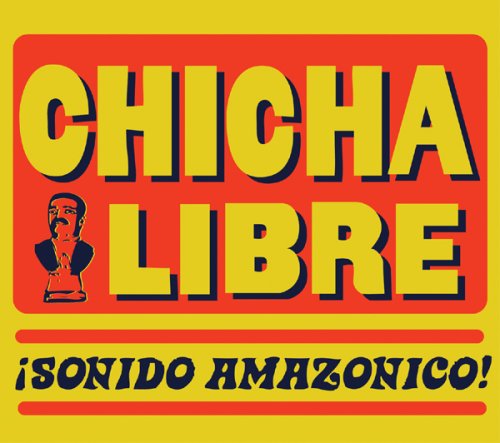 Chicha is the name of a corn-based liquor the Incas distilled in the days before The Conquest, and the word's mysterious, boozy etymology makes it perfect for the musical style that bears its name. Chicha - the music - was spontaneously distilled during the culture clash of the '60s when the Indian population of the Peruvian Amazon blended Columbian cumbias with American rock & roll, particularly the twang heavy sound of surf music. With cheap electric instruments, Amazon Indians used the syncopated beat of cumbia as the foundation for melodies that sound to western ears like Andean folk music played on electric guitar supported by Tex-Mex style Farfisa. When the Indians moved to Lima, chicha became a thriving subgenre, but since the 70s the style has been dying out. Olivier Conan, owner of New York's Barbés nightclub and record label, discovered the music on a 2005 trip to Peru. In 2007, he put out a compilation called The Roots of Chicha. The music so captivated New York's downtown crowd that he put together Chicha Libre, a combo comprised of New York's musical scene makers, and started playing the old hits, and some new compositions, to packed houses. Part of the charm of the old chicha recordings had to do with their distorted, lo-fi approach, something that you can't match in a Manhattan recording studio. Nonetheless, Sonido Amazonico!, named after a hit by the chicha band Los Mirlos, is a sunny, upbeat collection guaranteed to bring a silly smile to your face. Vincent Douglas' plays a twangy guitar and Josh Camp plays a rare Hohner Electravox, an accordion-like instrument that sounds like a 70s Farfisa, anchor the band's timeless sound (the Electrovox is an electric hybrid; no air passes through it).
Chicha is the name of a corn-based liquor the Incas distilled in the days before The Conquest, and the word's mysterious, boozy etymology makes it perfect for the musical style that bears its name. Chicha - the music - was spontaneously distilled during the culture clash of the '60s when the Indian population of the Peruvian Amazon blended Columbian cumbias with American rock & roll, particularly the twang heavy sound of surf music. With cheap electric instruments, Amazon Indians used the syncopated beat of cumbia as the foundation for melodies that sound to western ears like Andean folk music played on electric guitar supported by Tex-Mex style Farfisa. When the Indians moved to Lima, chicha became a thriving subgenre, but since the 70s the style has been dying out. Olivier Conan, owner of New York's Barbés nightclub and record label, discovered the music on a 2005 trip to Peru. In 2007, he put out a compilation called The Roots of Chicha. The music so captivated New York's downtown crowd that he put together Chicha Libre, a combo comprised of New York's musical scene makers, and started playing the old hits, and some new compositions, to packed houses. Part of the charm of the old chicha recordings had to do with their distorted, lo-fi approach, something that you can't match in a Manhattan recording studio. Nonetheless, Sonido Amazonico!, named after a hit by the chicha band Los Mirlos, is a sunny, upbeat collection guaranteed to bring a silly smile to your face. Vincent Douglas' plays a twangy guitar and Josh Camp plays a rare Hohner Electravox, an accordion-like instrument that sounds like a 70s Farfisa, anchor the band's timeless sound (the Electrovox is an electric hybrid; no air passes through it).Like reggae, the chicha groove is so recognizable, and flexible, that almost any style of music can be played using it. The playing here has a lightness and humor that the originals lacked, but Chicha Libre's not making any claims about being authentic or keeping a lost tradition alive. They're playing it for kicks, and they supply plenty of 'em. ~ j. poet, All Music Guide
Guitars are music instruments that are very versatile; most musicians around the entire world use them because they find a guitar to be very easy to play.
They are also the most commonly chosen instrument for a student to start playing their way into music, mostly because it takes very little time to learn how to play it, and of course because it is not rare to be able to find a decent guitar for a very convenient price (unlike other instruments as pianos, for instance).
Today, all music shops offer a very wide variety of guitars, suitable for almost any musician, from beginners to masters. The most popular, however, are these two kinds of guitars: Acoustic guitars and electric 6-strings guitars.
Some very specialized vendors have started selling other classes of guitars; usually adaptations of the classical guitar made by different cultures all around the world. In these vendors shops, regular customers (mostly collectors) are able to buy guitars such as the Mexican guitarron, a huge guitar used by Mariachis, or as the guitarra criolla, an Argentinean adaptation of the 6-strigs classical guitar, used by Tango orchestras and also by the famous gauchos (the south-american version of cowboys).
Another advantage of guitars is that, once you learned the basics of music composition, you will find it easer to move into more complex instruments, such as violins, and keyboard instruments; which are more difficult to use as the first contact with music practicing.
Beyond all that, the key to guitars success (they are the most used musical instrument worldwide, and has been for a very long time) is what matters the most: its sound. The beautiful sound a guitar produces can be compared to the sound produced by instruments that are much more expensive, rare and hard to learn. That is what keeps a good guitar above the rest.
Tamara Williams is a successful author and contributor to Guitars which is dedicated to providing useful guitar help, tips, information on products and services for guitar players.
90's dance music
No comments:
Post a Comment